Israel Resumes Razing Homes to Punish Attackers
Israel resumes razing homes to punish attackers
Israel says it needs tougher tools to stop recent "lone wolf" attacks on Jews by Palestinians. But critics say the practice is strikingly at odds with basic notions of justice, fairness and legality in a democracy — and that it is bound to bring on more hatred rather than serve as a deterrent.
Israel has given house demolition notices to families of six Jerusalem assailants, including the Shalodis and the relatives of two cousins who killed five people in a synagogue last week.
In razing the homes of attackers, Israel is reviving a punishment it largely halted in 2005. An army committee found at the time that punitive demolitions don't deter potential attackers.
Government spokesman Mark Regev said Israel's security services now "firmly believe that this can be an effective deterrent."
He was backed by Cabinet minister Yaakov Peri, a former head of Israel's Shin Bet security service, who said lone assailants can't be stopped by conventional means, and that the demolitions of homes, if carried out quickly, can be effective.
Others said the government simply tried to appease a jittery public.
"There is no policy component here. The only thing left is simple revenge," said Jeff Halper, a longtime campaigner against demolitions. "The government needs to do something quick, wants to show it is tough."Human rights groups say razing homes as a deterrent amounts to collective punishment and violates the rules that govern occupied territories such as east Jerusalem, which Israel captured in 1967, along with the West Bank and Gaza.
"This is a deliberate policy of punishing the innocent," said Sarit Michaeli of B'Tselem, an Israeli human rights group. "This is completely unacceptable in a country that aims to be a democracy."The demolitions come at a time of heightened tensions in Jerusalem, a volatile city at the heart of the Israeli-Palestinian conflict.
Palestinian residents complain of longstanding official discrimination and fear Israel is marginalizing them further with settlements and a separation barrier slicing through Arab neighborhoods.
Violence "will only stop when they end the occupation," said Enas Shalodi, who now lives with her husband and remaining children in two rooms in a relative's temporarily vacant apartment in her building.
Israel has demolished hundreds of Palestinian homes as punishment since 1967, along with thousands more that were razed for other reasons, such as lacking building permits, which Palestinians say are difficult to get from Israel.
Between 1987 and 2005, a period encompassing two Palestinian uprisings, Israel destroyed 1,115 Palestinian homes as punishment, partially demolished 64 and sealed or partially sealed 417, according to B'Tselem.
Punitive demolitions were largely halted in February 2005 after the army committee deemed them ineffective. That decision followed four years in which Palestinian bombers and gunmen killed more than 1,000 Israelis.
Some in Israel fear they are seeing the start of a third uprising.
Religious passions among Muslims — the vast majority of the city's Palestinians — have been stoked by demands from some members of Prime Minister Benjamin Netanyahu's coalition to allow Jewish worship at a major Jerusalem shrine that is run by Muslims but is sacred to both faiths.
In this climate, lone Palestinian assailants have struck repeatedly in Jerusalem:
— In August, the driver of a construction vehicle ran over and killed an inspector at a building site.
— In October, a week after the attack by Shalodi, a waiter shot and severely wounded a rabbi who has been pushing for Jewish prayer rights at the contested holy site.
— In early November, a motorist slammed a minivan into a crowd waiting for a train, killing two people.
— Last week, cousins Ghassan and Oday Abu Jamal, wielding meat cleavers, knives and a handgun, killed four Jewish worshippers and a policeman in the synagogue attack.
All six assailants were shot to death on the spot by security forces, and Netanyahu ordered their family homes demolished.
Netanyahu said suicide attackers may not care if they die, "but they care if in some cases, and often in many cases, if their homes are demolished afterward or sealed."
"We're looking at other means as well, but just imagine what the American public would say if you had — day in and day out — these terrorist murderers coming in, blowing up people, knifing people, running down people with cars," Netanyahu said Sunday in an interview with ABC's "This Week."
"You'd want to look for the ways that are effective to deter such future attacks, both to protect people in real time, but also to deter future suicides. And home demolitions is one of those means," he added.Shalodi's home was the first to be destroyed because his family did not appeal. The other five families have submitted appeals and will go to Israel's Supreme Court if needed, their lawyers said.
The high court has overwhelmingly ruled against Palestinian homeowners in the past, according to B'Tselem.
Palestinians whose homes are demolished by Israel usually receive some compensation from the Palestinian self-rule government in the West Bank. Relatives of "martyrs," or those killed in attacks or confrontations with Israeli forces, receive a monthly stipend. Officials would not discuss the amounts involved.
"My son is gone," she said. "I want my son, not the house. They come to demolish the house? Let them."
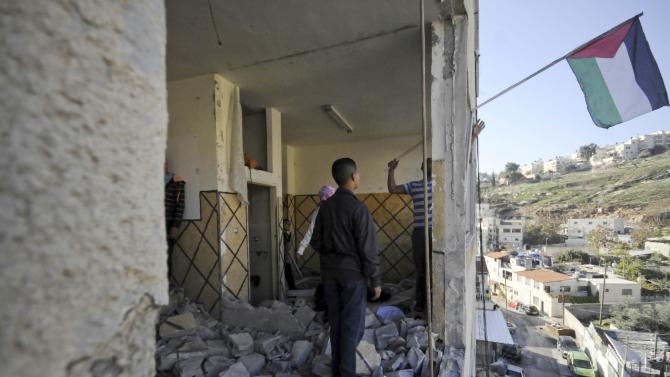
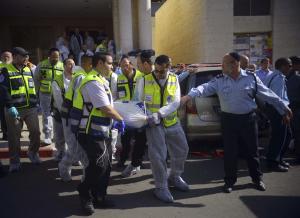
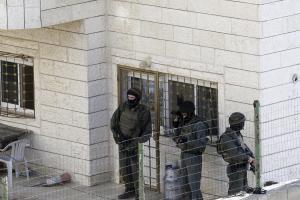
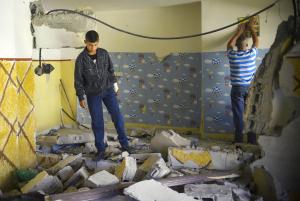
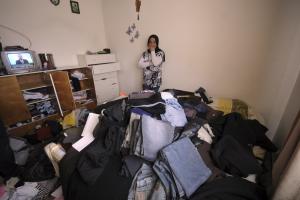
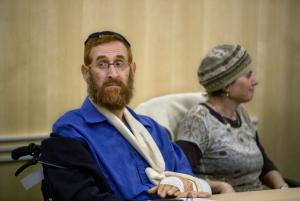
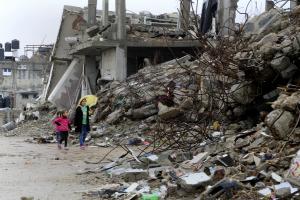



No comments:
Post a Comment